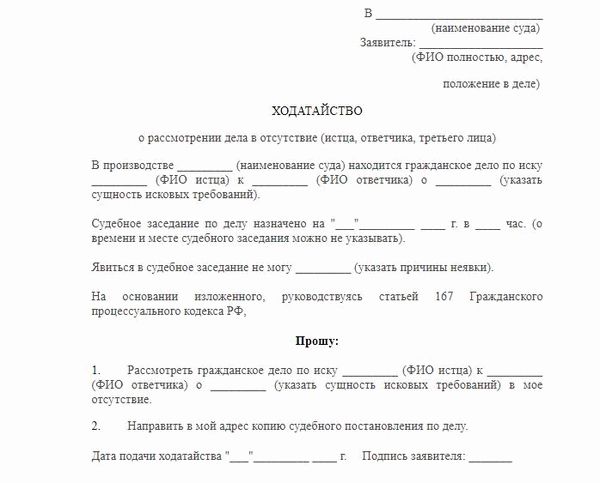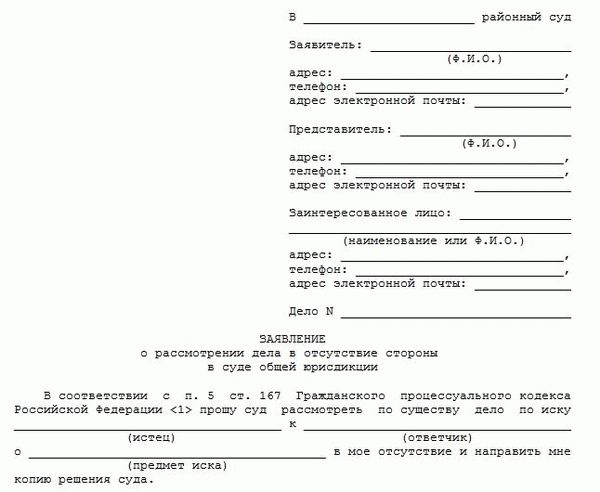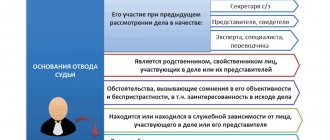How to draw up a petition to consider a case in the absence of the plaintiff, defendant, or third party? Is it always necessary to appear in a civil case? What valid reasons for absence can there be?
We will consider all possible options for considering the case in the absence of the persons involved. We will tell you how to correctly draw up and submit to the court an application for consideration of a case without the presence of a party. Let’s answer the question: “can the court consider the case without my presence?”
Download a sample petition for your situation and get advice on your situation from our lawyers.
Consideration of a case in the absence of the plaintiff, defendant and other persons
There is no rule in civil procedural law that obliges you to be personally present in court if you are a party to the case. Although the law provides for the obligation to notify the court of the reasons for failure to appear, there is no liability for the absence of such a message.
The court cannot oblige the persons participating in the case to appear in court and present any documents. At the same time, the court has the obligation to notify about the time and place of the trial (Article 150 of the Code of Civil Procedure of the Russian Federation). Since there is no obligation to appear in court, the parties’ requests to force the other party to personally appear in court cannot be resolved positively.
At the same time, the lack of sanctions for failure to appear at a court hearing may be compensated by other negative consequences for participants in civil proceedings.
It is necessary to distinguish between the impossibility of appearing in court for some objective reasons of a valid nature and reluctance to participate in the trial. Participants in a case always have the opportunity to request a postponement of the consideration of the case.
| Note! |
| Motion for adjournment |
In the absence of petitions and statements indicating the reasons for failure to appear, the court, if there is evidence of proper notification, may consider the case in the absence of the defendant, plaintiff and other persons. In this case, the party’s position in the case will not be heard, the party will be deprived of the opportunity to respond in a timely manner to the opponent’s explanations and the evidence presented by him. When making a negative decision, the appellate authority will not accept a reference to failure to appear (in the absence of a request for consideration in the absence of a person) as an argument for canceling the decision.
Legislative framework: grounds for absentee review
Any civil cases can be considered in absentia under one condition - the party did not come to court and did not provide evidence that the reason for the absence was valid (absence due to illness, business trip, etc.).
However, even in this case, consideration of the case in absentia is impossible if:
- the plaintiff does not agree with this;
- the plaintiff has changed the subject or grounds of the claim;
- the defendant did not come to the hearing, but notified the judge in advance and attached relevant documents to the application.

Notification of non-participation in the case is submitted in the form of a petition - a sample document is discussed below.
This is interesting: Petition to exclude evidence in a criminal case
Petition to consider the case in the absence of the defendant
The defendant has the right to file a motion to consider a civil case in his absence, indicating or without indicating the reasons for his failure to appear. In the absence of a statement from the defendant, the case will be considered in absentia proceedings (Article 233 of the Code of Civil Procedure of the Russian Federation).
We recommend that defendants in any case write to the court objections or responses to the claims. This will allow you to convey in writing your position on the case under consideration, which must be taken into account by the court when making a court decision.
| Note! |
| Objections to the claim |
It makes sense not to file a petition to consider the case in the absence of the defendant if there is no desire to appear in court, he needs to drag out the case and there is a possibility of subsequent cancellation of the default judgment.
In other cases, it would be correct for the defendant to draw up and submit to the court his application for consideration of the case without his presence. Download a sample petition for consideration in the absence of the defendant on the website.
Why you shouldn't miss meetings
First of all, if the defendant does not come to court hearings, this will delay the process, which may be disadvantageous for both parties.
Another unpleasant moment that a defendant may face is a fine. If the judge does not see the request to consider the case in the absence of the defendant, he may regard the failure to appear as contempt and impose a fine.
And the third option is to consider the claim without the participation of the defendant. In fact, this party will simply deprive itself of the right to protect its interests.
These three options will definitely not lead to the fact that the defendant will be able to defend himself and win the trial, at least partially. Moreover, filing an application to consider the case in the absence of the defendant confirms the seriousness of intentions and respect for the judge himself and the justice system in general.

Request for consideration of the case in the absence of the plaintiff
The plaintiff also has the right not to appear in court to hear the case regarding his claim. The presence of valid reasons does not matter. A simple reluctance to be present in person at the trial is enough.
For the plaintiff, a negative reason for the absence of a request to consider the case in his absence will be the possibility of leaving the statement of claim without consideration (Article 222 of the Code of Civil Procedure of the Russian Federation). This occurs when the plaintiff repeatedly fails to appear at the court hearing without a valid request, in the absence of a request to consider the case without his presence.
The plaintiff may specifically not file an application, since in some cases it may be advantageous to leave his claim without consideration (for example, there is no necessary evidence), so that later, after some time, the case can be reopened and its consideration continued.
Download our sample application for consideration in the absence of the plaintiff.
Legal basis
According to the requirements of Article 167 of the Civil Procedure Code, the parties to the process do not have the right to refuse to participate in the process; they are obliged to report that they will be absent. In this case, the reasons for absence must be valid, for example:
- death of a loved one;
- disease;
- long business trip to another region or country, and so on.
Any justification must be documented.

Consideration of a case in the absence of a third party
Third parties are more likely than other participants in a civil case to inform the court about considering the case without their presence. This is because the decision does not directly define their rights and obligations. However, third parties should take into account that they are involved in the case, since the court’s decision may affect their rights and obligations (Article of the Code of Civil Procedure of the Russian Federation). A decision in a civil case can be used subsequently as having prejudicial force when claims are brought directly against a third party (for example, in a recourse claim).
We recommend that a third party inform the court about the possibility of considering the case in his absence by filling out a petition using our sample. In addition, a third party has the right to submit a written response to the statement of claim, in which he can reflect his position on the issue being considered in court.
| Note! |
| Feedback on the statement of claim |
We suggest using our sample application (petition) for consideration of a civil case without the participation of a third party.
Petitions with a representative
The presence of a representative of a person participating in the case does not relieve him of the obligation to notify the court of the reasons for failure to appear, even if the representative himself participates in the court hearing. As a rule, the courts require that the application for consideration of the case in absence be written by the party in his own hand.
If a party fails to appear and a representative appears, there may be the same adverse consequences in the form of abandonment without consideration or proceedings in absentia.
A representative of a legal entity, organization or government body may file a petition to consider the case in the absence of the representative. As a rule, the court does not raise questions regarding such statements.
Petition from the plaintiff
On the other hand, if the defendant fails to appear, the case begins to drag on, which is disadvantageous for the plaintiff. Many citizens begin to clearly abuse the situation, based on the fact that by not appearing they gain time, demotivate the plaintiff, can find additional evidence in their favor, etc. There are also frequent cases when defendants believe that without them the court will still not be able to make a decision, which means that in this way they will be able to evade responsibility for quite a long time.
In such a situation, the plaintiff also has the right to file a petition, which has exactly the same structure as the document discussed above. The decision on the possibility/impossibility of holding a hearing in absentia can only be made by a judge, so the outcome is largely ambiguous. There are 2 options:
- The judge grants the motion, makes a decision, and sends a copy to the defendant. If the defendant does not appeal the decision within 1 month, it comes into force and enforcement proceedings begin - for example, seizure of accounts, transfer of property, etc. The deadlines may be violated, but for this the defendant must provide convincing evidence (for example, medical certificates of hospital treatment).
- The judge does not grant the petition, since without the testimony of the defendant, the case cannot be considered comprehensively and objectively. Then he instructs the bailiffs to find the citizen and ensure his arrest.
Drawing up and submitting a petition to the court
Drawing up a petition in which citizens or representatives of legal entities ask to consider the case without their participation is not very difficult. However, it requires certain details that must be specified:
- the court in which your application is addressed
- personal data and procedural status
- name of the application - Petition for consideration of the case in the absence
- details of the civil case for which the petition is being filed
- request to consider the case without your participation
- date and signature of the applicant
Additionally, in the petition you can request that a copy of the court order be sent by mail to your home address.
A request to consider a case in absence can be filed as a separate statement, but it is also permissible to include it in the text of other petitions and statements. addressed to the court. Plaintiff. For example. may declare the consideration of the case without his participation already in the statement of claim. and the defendant in the submitted objections.
The petition can be submitted to the court in person (to the judge or through the office) or sent to the court by mail. Your representative can also deliver such a statement. There are no special requirements for this action.
A request to consider a case in the absence of its participants is resolved by the court at a court hearing, the court issues a ruling indicating the possibility of considering the case in the absence of persons participating in the case.
Petition from the defendant
The structure of the document is standard - the following data must be reflected in the application:
- Name of the court.
- Full name of the applicant, his address and contact details, status in court (plaintiff, defendant or third party).
- Document's name.
- Description of the case, full names of the parties, subject of the claim.
- Description of the reason for absence.
- You can also separately indicate whether the defendant admits the claims or not: however, this point is not mandatory.
- The pleading part is to hold the hearing in absentia and send a copy of the court decision.
- Date of compilation and signature of the applicant with transcript (last name, initials).
When drawing up a document, you can use this example as a guide.









